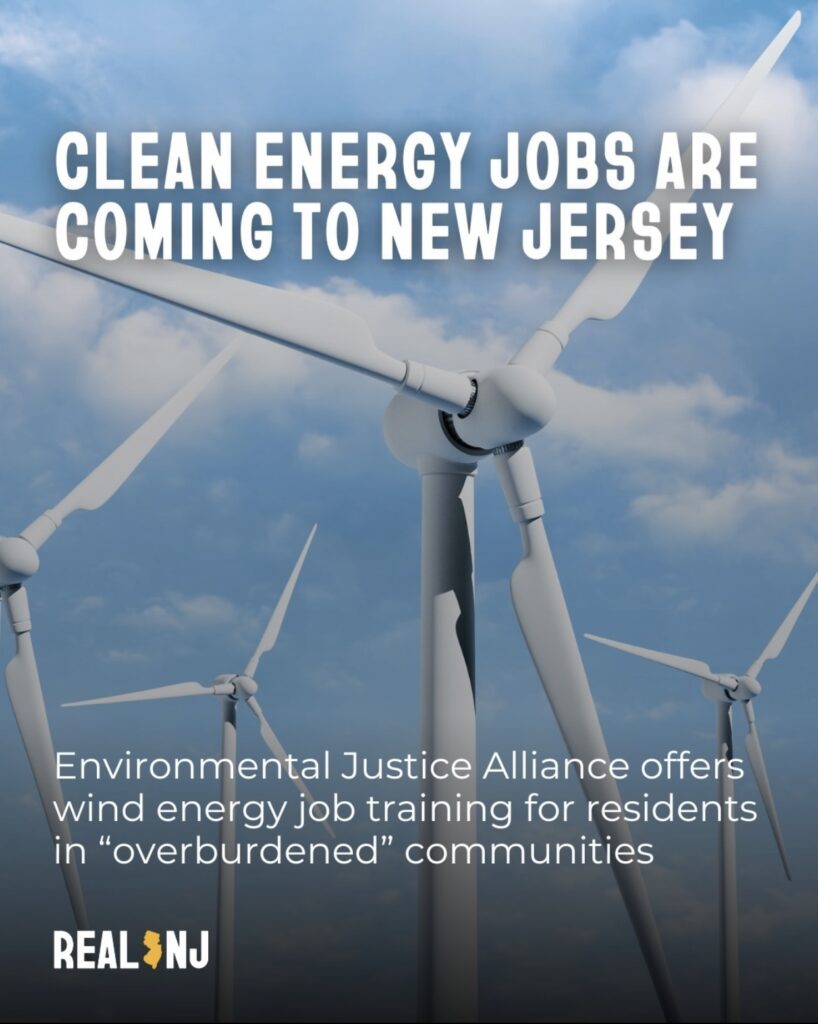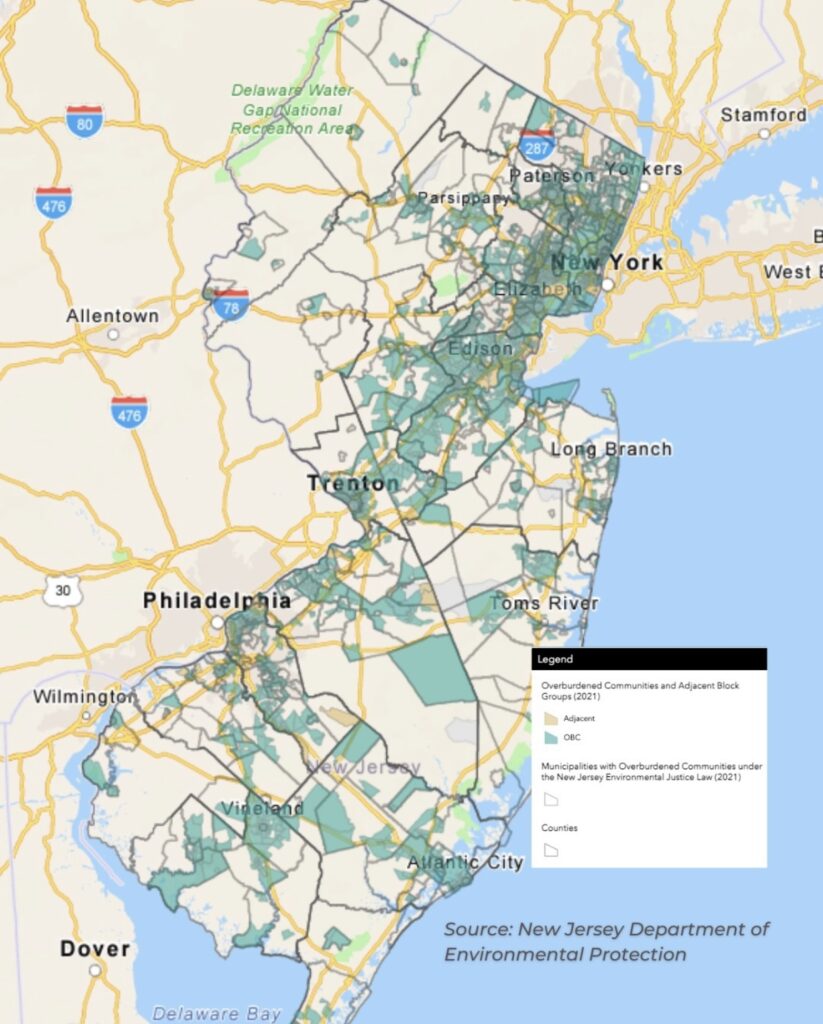🗓 Save the Date: Learn more about our Offshore Wind Training Program by registering for this info session in Newark.
Continue readingNJEJA Celebrates Success of Inaugural Offshore Wind Training Program
Orsted Canceling Offshore Wind in New Jersey is Bad News, But Not the End of the Story
This article was originally published by The Philadelphia Inquirer on November 3, 2023.
By: Brooke Helmick, Melissa Miles
The transition away from fossil fuels is an urgent necessity, but we must ensure that renewable energy development doesn’t leave anyone behind.
On Tuesday, the offshore wind developer Orsted announced that it had decided to scrap both of its New Jersey projects, citing rising interest rates and supply-chain problems. The projects, combined, would have powered over 1.6 million homes and were part of Gov. Phil Murphy’s plan to address climate change.
But this setback is by no means the end of renewable energy in the Garden State. In order to ensure a full and just transition to clean energy technologies, New Jersey must continue to prioritize the economic stability and well-being of communities that have been historically sidelined from the benefits of energy development.
Job training is among the most important outcomes of any potential renewable energy project.
Our organization, the New Jersey Environmental Justice Alliance, works with communities that have been disproportionately exposed to and negatively impacted by hazardous pollution and industrial practices. This includes Newark, Camden, Edison, and Bayonne, which are close to waste incinerators, power plants, Superfund sites, and other highly toxic sources of pollution.
In June, we joined the first cohort of community-facing organizations to receive workforce development grants as part of the New Jersey Economic Development Authority’s offshore wind initiative. We worked to help inform the process of introducing offshore wind in a manner that centered, or at least included, communities that are currently hosting power plants and refineries. These communities have been historically cut out of important conversations and initiatives like this one.
Within these meetings, we as an environmental justice organization worked to reframe the conversation around the immediate needs and risks of overburdened communities. These projects were one avenue for ensuring that New Jersey residents traditionally impacted by toxicity and pollution were no longer just the victims of bad policy, but active participants and the protagonists in the story of what comes next.
In the pursuit of a just transition away from fossil fuels, we must continue to ensure that the transition to clean energy does not leave people behind. As made visible by the New Jersey Environmental Justice Mapping, Assessment, and Protection Tool, areas such as Newark, Camden, Edison, and Bayonne are among the overburdened communities consistently at risk.
The question of economics weighs heavily for environmental justice advocates as we seek to work with allies and state agencies to bring clean technologies to our state, while simultaneously ensuring that we do not replicate the current systems of economic imbalance. We cannot and must not sacrifice the economic stability of our environmental justice communities while we develop long-term green technology options.
When picturing offshore wind, cities like Newark, Elizabeth, Rahway, and Camden may not immediately come to mind. However, these cities are either the sites of health-harming energy infrastructure, polluting ports, or both. These same communities, and others like them, have borne the burdens of keeping the state and the region running without seeing many benefits.
Understanding that the prospect of mega wind farms off the coast presented challenges, specifically to some of the communities at the Shore, we knew it would be doing fossil energy-impacted communities a disservice if we did not enter into the conversation.
Offshore wind is never going to be a singular, all-encompassing solution, but it does provide environmental justice communities an opportunity to be active participants in building safer, healthier, and more sustainable communities. Offshore wind offers not only a greener, cleaner technology than fossil fuels but also the potential for job investment in communities that have historically faced economic disadvantages and financial hardships.
Orsted’s announcement this week came not only as a surprise but as a disappointment. As the Murphy administration considers other renewable energy projects, it is imperative that state leaders are intentional about equally distributing both the benefits and risks of transitioning to new technologies.
The transition away from fossil fuels is an urgent necessity, but we must ensure that the choices we make today — which will continue to impact future generations — are ones that don’t leave anyone behind.
One solution is not going to fix climate change. One setback won’t stop climate action, either.
NJEJA Offers Wind Energy Job Training for Residents in Overburdened Communities
This article was originally published by Real NJ on November 1, 2023.

The New Jersey Environmental Justice Alliance @njejalliance is teaming up with Soulful Synergy @_soulfulsynergy_ and the Newark Workforce Development Board to bring offshore wind workforce development training programs to New Jersey residents in the greater Newark area, and other overburdened communities in the state.
New Jersey is expected to rely more on offshore wind power for its energy needs in the coming years. Governor Murphy set clean energy milestones for the state with the goals of reaching 100% clean energy by 2050, and increasing New Jersey’s previous offshore wind energy goal by nearly 50 percent to 11,000 megawatts (MW) by 2040.
Halimah Shabazz with NJEJA says overburdened communities don’t have the same protection from climate change as other communities leaving them vulnerable to “disparities in experiencing more extreme weather events like flooding or extreme heat because of things like low tree cover…”
“I would say this training is a stepping stool. Sometimes, people don’t go for certain types of jobs especially when they see requirements like OSHA 30, which isn’t a free training. So we are providing this training for free to our participants and they are gaining a stipend for their time and commitment at the end of the program,” said Shabazz.
With increased demand for wind power, more clean energy jobs are also coming to New Jersey over the next 3-5 years, says Shabazz. NJEJA wants those from overburdened communities to know about what skills are required so that they can apply for those jobs.
The goal of the training program is to make sure the communities most impacted by climate change and pollution are able to benefit from New Jersey’s transition to clean energy solutions, by “setting people up to be able to get other construction jobs or even learning or putting themselves in a great position to have a job that requires specific skills,” says Shabazz.
In the six-week training program development training, participants can expect to learn where to look and apply for the jobs, resume help, hands-on construction skills training, site safety, which is really important on a construction site. They are also going to get OSHA 30 certification, which is one of the concrete things that you need when you’re going into a construction job, and learning about the fundamentals of offshore wind structures.
“One of the critical pieces for this training is the Environmental Justice 101 training. So if you’ve never heard of “overburdened”, if you’ve never heard of “environmental justice”, it gives people an opportunity to learn about what, what these things are, how they’re impacted, and then seeing how gaining this training and connecting it with environmental justice is actually extremely beneficial for them,” says Shabazz.
The kinds of jobs that will be available will vary from installation and commissioning turbine manufacturing, operations, maintenance, project management and development, and balance of plant manufacturing.
NJEJA plans to hold 3 trainings with 20 participants each for a total of 80 participants trained. Participants must be from a designated overburdened community, who typically wouldn’t have access to these jobs, as determined by the New Jersey Department of Environmental Protection.

Participants must be 18 years of age and older. You must first attend an information session in order to have your application for the training program considered. Residents interested in the training can follow @njeja to learn more.


